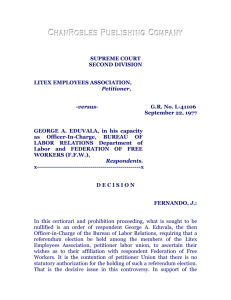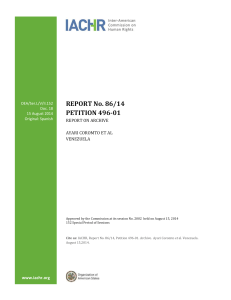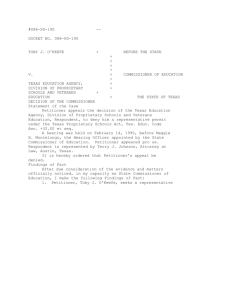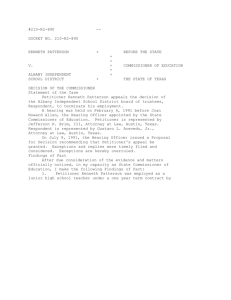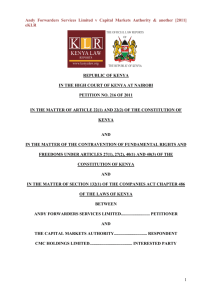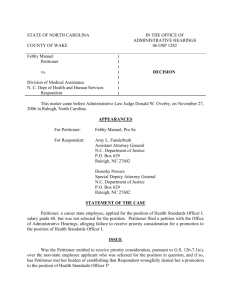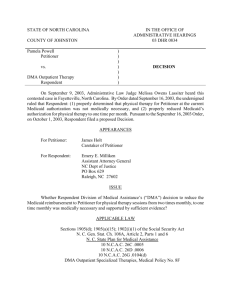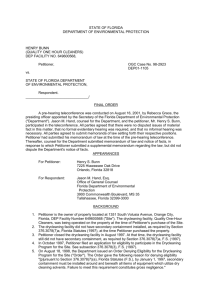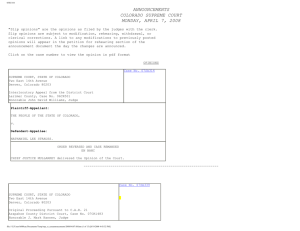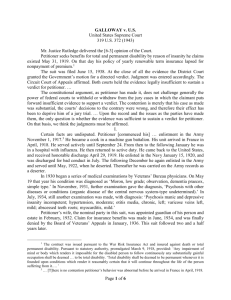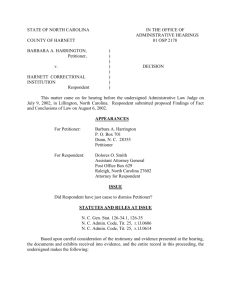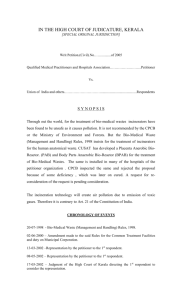Original Text Version of Clarence Gideon`s Petition to Supreme
advertisement
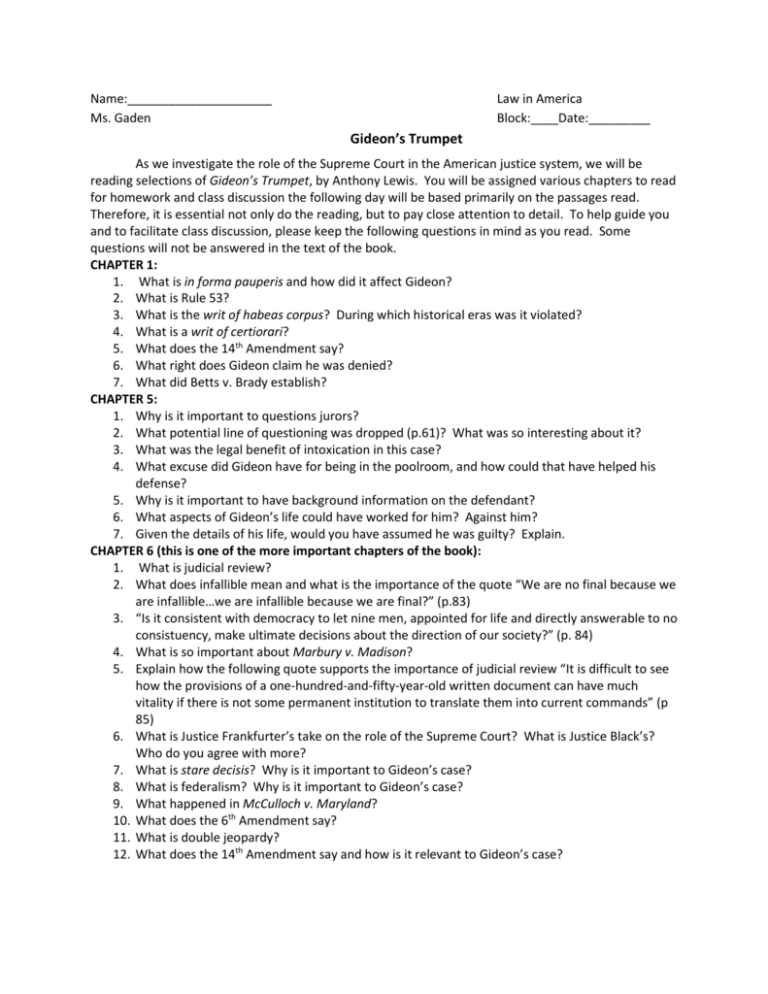
Name:_____________________ Ms. Gaden Law in America Block:____Date:_________ Gideon’s Trumpet As we investigate the role of the Supreme Court in the American justice system, we will be reading selections of Gideon’s Trumpet, by Anthony Lewis. You will be assigned various chapters to read for homework and class discussion the following day will be based primarily on the passages read. Therefore, it is essential not only do the reading, but to pay close attention to detail. To help guide you and to facilitate class discussion, please keep the following questions in mind as you read. Some questions will not be answered in the text of the book. CHAPTER 1: 1. What is in forma pauperis and how did it affect Gideon? 2. What is Rule 53? 3. What is the writ of habeas corpus? During which historical eras was it violated? 4. What is a writ of certiorari? 5. What does the 14th Amendment say? 6. What right does Gideon claim he was denied? 7. What did Betts v. Brady establish? CHAPTER 5: 1. Why is it important to questions jurors? 2. What potential line of questioning was dropped (p.61)? What was so interesting about it? 3. What was the legal benefit of intoxication in this case? 4. What excuse did Gideon have for being in the poolroom, and how could that have helped his defense? 5. Why is it important to have background information on the defendant? 6. What aspects of Gideon’s life could have worked for him? Against him? 7. Given the details of his life, would you have assumed he was guilty? Explain. CHAPTER 6 (this is one of the more important chapters of the book): 1. What is judicial review? 2. What does infallible mean and what is the importance of the quote “We are no final because we are infallible…we are infallible because we are final?” (p.83) 3. “Is it consistent with democracy to let nine men, appointed for life and directly answerable to no consistuency, make ultimate decisions about the direction of our society?” (p. 84) 4. What is so important about Marbury v. Madison? 5. Explain how the following quote supports the importance of judicial review “It is difficult to see how the provisions of a one-hundred-and-fifty-year-old written document can have much vitality if there is not some permanent institution to translate them into current commands” (p 85) 6. What is Justice Frankfurter’s take on the role of the Supreme Court? What is Justice Black’s? Who do you agree with more? 7. What is stare decisis? Why is it important to Gideon’s case? 8. What is federalism? Why is it important to Gideon’s case? 9. What happened in McCulloch v. Maryland? 10. What does the 6th Amendment say? 11. What is double jeopardy? 12. What does the 14th Amendment say and how is it relevant to Gideon’s case? CHAPTER 8: 1. What does the 6th amendment say? 2. Why was Powell v. Alabama “an historic advance for liberty? 3. List the 9 cases mentioned in this chapter and briefly explain their ruling with regard to providing a defendant with a lawyer. CHAPTER 13: 1. On pg 203 the author refers to a “non-system.” What is he talking about? 2. What did the Allen Committee propose? 3. What was the problem with assigning lawyers who did not get paid to the poor? 4. Explain the following quote from page 207: “Just as doctors are not expected to provide all the facilities for dealing with illness of the poor, lawyers cannot be expected to bear all the burdens of the decisions of prosecutors to prosecute the indigent.” 5. What is a public defender? a. Provide one argument FOR public defenders b. Provide one argument AGAINST public defenders 6. What is the Legal Aid Society? 7. What did Justice Seymour and Clark propose? 8. Explain how TWO states reacted to the Gideon ruling Name:_______________ Ms. Gaden Law in America Block:___Date:________ Read the following text and define the bold terms. Highlight the sentence: I requested the court to appoint me attorney and the court refused. Original Text Version of Clarence Gideon's Petition to Supreme Court, 1962 In the Supreme Court of the United States; October Term, 1961; No. 890 Misc. Clarence Earl Gideon, Petitioner vs. H.G. Cochran, Jr., Director, Division of Corrections. State of Florida, Respondent “Answer to respondent’s response to petition for Writ of Certiorari.” Petitioner, Clarence Earl Gideon received a copy of the response of the respondent in the mail dated sixth day of April, 1962. Petitioner can not make any pretense of being able to answer the learned Attorney General of the State of Florida because the petitioner is not an attorney or vessed in law nor does not have the law books to copy down the decisions of this Court. But the petitioner knows there is many of them. Nor would the petitioner be allowed to do so. According to the book of Revised Rules of the Supreme Court of the United States sent to me by Clerk of the same Court. The response of the respondent is out of time (Rule #24). Under this rule the respondent has thirty days in which to make a response. The respondent claims that a citizen can get a equal and fair trial without legal counsel. That the constitution of the United States does not apply to the State of Florida. Petitioner thinks that the fourteenth ammend. makes this so. Petitioner will attempt to show this Court that a citizen of the State of Florida cannot get a just and fair trial without the aid of counsel. Petitioner when he wrote his petition for Writ of Habeas Corpus to the Florida Supreme Court and his petition to this Court for a Writ of Certiorari and this brief was and is not allowed to send out a prepared petition. Petitioner is required to write his petition under duress or as the Attorney General states, under physical restrain. If the petitioner had a attorney he could send out any kind of a petition he was so minded to. Which shows he can not have equal rights to the law unless he does have a attorney. The same thing applies to the lower court. If the petitioner would of had a attorney there would not of been allowed such things as hearsay perjury or Bill of attainer [Bill of Attainder] against him. Petitioner claims that there was never the crime of Breaking and Entering ever committed. At that time he call to the Federal Bureau of Investigation for help at Panama City, Fla., but was told they could not do nothing about it. Respondent claims that I have no right to file petitions for a Writ of Habeas Corpus. Take away this right to a citizen and there is nothing left. It makes no difference how old I am or what color I am or what church I belong too if any. The question is I did not get a fair trial. The question is very simple. I requested the court to appoint me attorney and the court refused. All countrys try to give there Citizens a fair trial and see to it that they have counsel. Petitioner asks of this court to disregard the response of the respondent because it was out of Time and because the Attorney General did not have one of his many assistant attorney generals to help me a citizen of the State of Florida to write my petition or this brief. But instead force me to write these petitions under duress. On this basis it is respectfully urged that the petition for Writ of Certiorari shall be issue. Petitioner Definitions: 1. 2. 3. 4. 5.
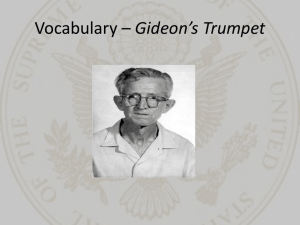

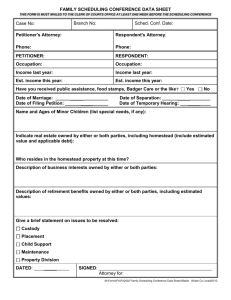
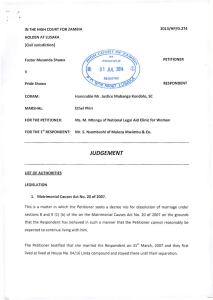
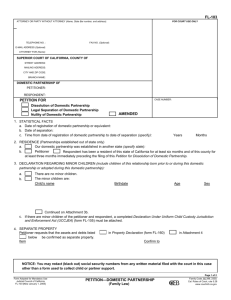


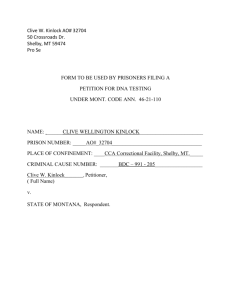
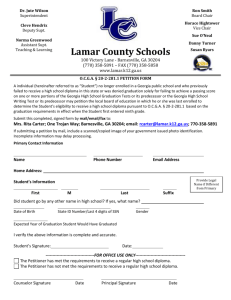
![Sealing the [brief/ petition/ other document]](http://s3.studylib.net/store/data/006979062_1-16cdc08ae1998f343f4729e55dca558a-300x300.png)
